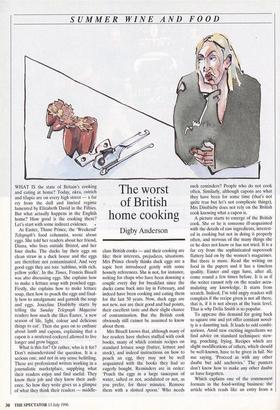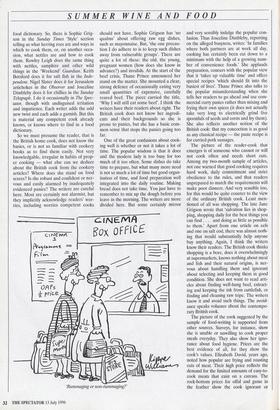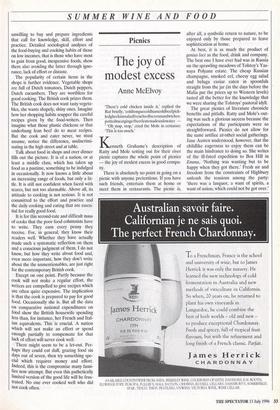SUMMER WINE AND FOOD
The worst of British home cooking
Digby Anderson
WHAT IS the state of Britain's cooking and eating at home? Today, okra, ostrich and tilapia are on every high street — a far cry from the dull and limited regime lamented by Elizabeth David in the Fifties. But what actually happens in the English home? How good is the cooking there? Let's start with some indirect evidence.
At Easter, Thane Prince, the 'Weekend' Telegraph's food columnist, wrote about eggs. She told her readers about her friend, Diana, who lives outside Bristol, and her four ducks. The ducks lay their eggs on clean straw in a duck house and the eggs are therefore not contaminated. And very good eggs they are too: 'sublime, with rich, yellow yolks'. In the Times, Francis Bissell was also discussing eggs. She explains how to make a lettuce soup with poached eggs. Firstly, she explains how to make lettuce soup, then how to poach the eggs and final- ly how to amalgamate and garnish the soup and eggs. Josceline Dimbleby starts by telling the Sunday Telegraph Magazine readers how much she likes Easter, 'a new season of life, light, colour and delicious things to eat'. Then she goes on to enthuse about lamb and capons, explaining that a capon is a neutered cockerel allowed to live longer and grow bigger.
What is this for? Or rather, who is it for? Don't misunderstand the question. It is a serious one, and not in any sense belittling. These are professional writers working in a journalistic marketplace, supplying what their readers enjoy and find useful. They know their job and they know their audi- ence. So how they write gives us a glimpse of what they think their readers — middle-
class British cooks — and their cooking are like: their interests, prejudices, situations. Mrs Prince clearly thinks duck eggs are a topic best introduced gently with some homely references. She is not, for instance, writing for chaps who have been downing a couple every day for breakfast since the ducks came back into lay in February, and indeed have been cooking and eating them for the last 50 years. Now, duck eggs are not new, nor are their good and bad points, their excellent taste and their slight chance of contamination. But the British cook obviously still cannot be assumed to know about them.
Mrs Bissell knows that, although many of her readers have shelves stuffed with cook books, many of which contain recipes on standard lettuce soup (butter, lettuce and stock), and indeed instructions on how to poach an egg, they may not be well acquainted with the books they had so eagerly bought. Reminders are in order: 'Poach the eggs in a large saucepan of water, salted or not, acidulated or not, as you prefer, for three minutes. Remove them with a slotted spoon.' Who needs such reminders? People who do not cook often. Similarly, although capons are what they have been for some time (that's not quite true but let's not complicate things), Mrs Dimbleby does not rely on the British cook knowing what a capon is.
A picture starts to emerge of the British cook. She or he is someone ill-acquainted with the details of raw ingredients, interest- ed in cooking but not in doing it properly often, and nervous of the many things she or he does not know or has not tried. It is a far cry from the sophisticated supercook flattery laid on by the women's magazines. But there is more. Read the writing on food in the papers and it has a timeless quality. Easter and eggs have, after all, come round a few times before. It is as if the writer cannot rely on the reader accu- mulating any knowledge. It starts from scratch. Indeed, I'm told angry readers will complain if the recipe given is not all there, that is, if it is not always at the basic level. That is why Delia Smith is so popular.
To appease this demand for going back to square one and yet offer constant novel- ty is a daunting task. It leads to odd combi- nations. Amid new exciting ingredients we find advice on standard techniques: stew- ing, poaching, frying. Recipes which are slight modifications of others, which should be well-known, have to be given in full. No use saying, 'Proceed as with any other daube but add anchovies.' The punters don't know how to make any other daube or have forgotten.
Which explains one of the commonest formats in the food-writing business: the article which reads like an entry from a
food dictionary. So, there is Sophie Grig- son in the Sunday Times 'Style' section telling us what herring roes are and ways in which to cook them, or, on another occa- sion, what nettles are and how to cook them. Rowley Leigh does the same thing with nettles, samphire and other wild things in the Weekend' Guardian. Keith Botsford does it for salt fish in the Inde- pendent. Nigel Slater does it for Jerusalem artichokes in the Observer and Josceline Dimbleby does it for chillies in the Sunday Telegraph. I do it occasionally in The Spec- tator, though with undisguised irritation and impatience. Each writer adds the odd new twist and each adds a garnish. But this is material any competent cook already knows, or knows where to find in a food dictionary.
So we must presume the reader, that is the British home cook, does not know the basics, or is not so familiar with cookery books as to find them easily. Not very knowledgable, irregular in habits of prop- er cooking — what else can we deduce about the British cook from the cookery articles? Where does she stand on food scares? Is she robust and confident or ner- vous and easily alarmed by inadequately evidenced panics? The writers are careful here. Most are certainly not alarmist, but they implicitly acknowledge readers' wor- ries, including worries competent cooks should not have. Sophie Grigson has `no qualms' about offering raw egg dishes, such as mayonnaise. But, 'the one precau- tion I do adhere to is to keep such dishes away from vulnerable groups'. There are quite a lot of these: the old, the young, pregnant women (how does she know in advance?) and invalids. At the start of the beef crisis, Thane Prince announced her stand on the matter. She mounted a clear, strong defence of occasionally eating very small quantities of expensive, carefully reared beef. The piece carried the title, 'Why I will still eat some beef'. I think the writers have their readers about right. The British cook does not know her ingredi- ents and their backgrounds so she is prone to panics, but she has a basic com- mon sense that stops the panics going too far.
One of the great confusions about cook- ing well is whether or not it takes a lot of time. The popular wisdom is that it does and the modern lady is too busy for too much of it too often. Some dishes do take time to prepare, but what many more need is not so much a lot of time but good organ- isation of time, and food preparation well integrated into the daily routine. Making bread does not take time. You just have to remember to mix up the dough before you leave in the morning. The writers are more divided here. But some certainly mirror 'Rummaging or non-rummaging?' and very sensibly indulge the popular con- fusion. Thus Josceline Dimbleby, reporting on the alleged busyness, writes: 'In families where both partners are at work all day, cooking has certainly been cut down to a minimum with the help of a growing num- ber of convenience foods.' She applauds preparation, concurs with the popular view that it 'takes up valuable time' and offers special recipes 'which should fit into the busiest of lives'. Thane Prince also talks to the popular misunderstanding when she tells her readers to go ahead and use com- mercial curry pastes rather than mixing and frying their own spices (it does not actually take very long to electrically grind five spoonfuls of seeds and corns and fry them). She also reflects another notion of the British cook: that my concoction is as good as any classical recipe — the paste recipe is for curried pork sausages.
The picture of the reader-cook that emerges is of someone who cannot or will not cook often and needs short cuts. Among my two-month sample of articles, not one warned that good cooking requires hard work, daily commitment and strict obedience to the rules, and that readers unprepared to match the requirements will make poor dinners. And very sensible too, for this would be quite counter to the view of the ordinary British cook. Least men- tioned of all was shopping. The late Jane Grigson wrote that 'salvation lies in shop- ping, shopping daily for the best things you can find ... and doing as little as possible to them.' Apart from one article on eels and one on salt cod, there was almost noth- ing that would substantially help anyone buy anything. Again, I think the writers know their readers. The British cook thinks shopping is a bore, does it overwhelmingly at supermarkets, knows nothing about meat and fish and their natural origins, is ner- vous about handling them and ignorant about selecting and keeping them in good condition. She does not want to read arti- cles about finding well-hung beef, extract- ing and keeping the ink from cuttlefish, or finding and cleaning raw tripe. The writers know it and avoid such things. The avoid- ance speaks volumes about the contempo- rary British cook.
The picture of the cook suggested by the sample of food-writing is supported from other sources. Surveys, for instance, show she is unable or unwilling to cook proper meals everyday. They also show her igno- rance about food hygiene. Prices are the best evidence of all, for they show the cook's values. Elizabeth David, years ago, noted how popular are frying and roasting cuts of meat. Their high price reflects the demand for the limited amounts of easy-to- cook meats that exist on a carcass. The rock-bottom prices for offal and game in the feather show the cook ignorant or unwilling to buy and prepare ingredients that call for knowledge, skill, effort and practice. Detailed sociological analyses of the food-buying and cooking habits of those on low incomes, that is those who have most to gain from good, inexpensive foods, show them also avoiding the latter through igno- rance, lack of effort or distaste.
The popularity of certain items in the shops is further evidence. Vegetable shops are full of Dutch tomatoes, Dutch peppers, Dutch cucumbers. They are worthless for good cooking. The British cook prizes them. The British cook does not want tasty vegeta- bles, she wants shapely, shiny ones. Imagine how her shopping habits scupper the careful recipes given by the food-writers. Then imagine what those plastic chickens or that underhung lean beef do to meat recipes. But the cook and eater never, we must assume, notice the difference, undiscrimi- nating in the high street and at table.
Talk about food in shops and over dinner fills out the picture. It is of a nation, or at least a middle class, which has taken up food as a pastime, something to be indulged in occasionally. It now knows a little about an increasing range of foods, but only a lit- tle. It is still not confident when faced with scares, but not too alarmable. Above all, its attitude to cooking is not serious. It is not committed to the effort and practice and the daily cooking and eating that are essen- tial for really good food.
It is for this second-rate and difficult mass of cooks that the poor food columnists have to write. They earn every penny they receive. For, in general, they know their readers well. Whether they have actually made such a systematic reflection on them and a conscious judgment of them, I do not know, but how they write about food and, even more important, how they don't write about the the unmentionables, are just right for the contemporary British cook.
Except on one point. Partly because the cook will not make a regular effort, the writers are compelled to give recipes which are often quite expensive. The implication is that the cook is prepared to pay for good food. Occasionally she is. But all the data on comparative national expenditures on food show the British housewife spending less than, for instance, her French and Ital- ian equivalents. This is crucial. A nation which will not make an effort or spend enough partially to compensate for that lack of effort will never cook well.
There might seem to be a let-out. Per- haps they could eat dull, grazing food six days out of seven, then try something spe- cial which requires money and effort. Indeed, this is the compromise many fami- lies now attempt. But even this pathetically limited version of the good life will be frus- trated. No one ever cooked well who did not cook often.




































































 Previous page
Previous page